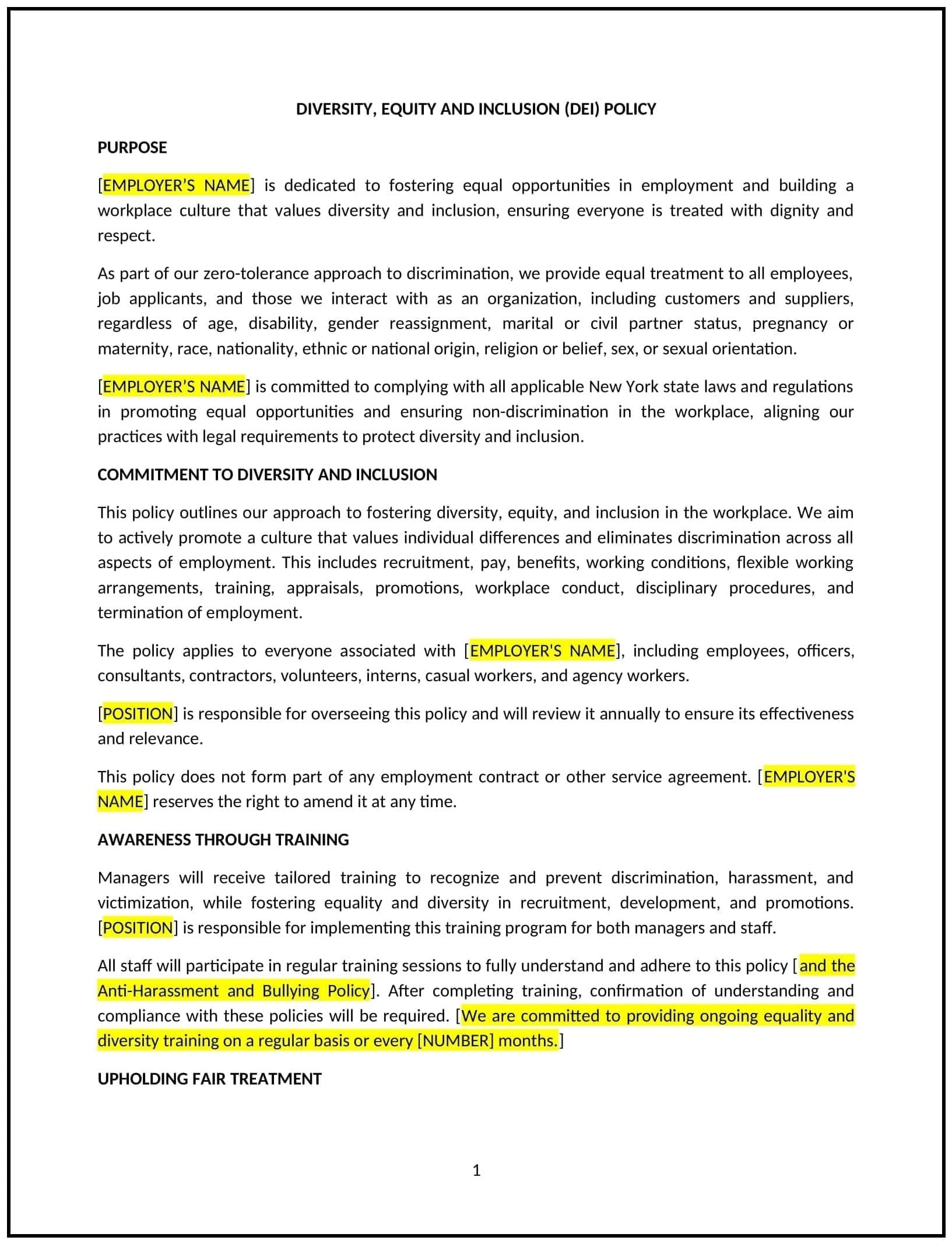Diversity, equity and inclusion (DEI) policy (New York): Free template
Got contracts to review? While you're here for policies, let Cobrief make contract review effortless—start your free review now.

Customize this template for free
Diversity, equity, and inclusion (DEI) policy (New York)
A diversity, equity, and inclusion (DEI) policy helps New York businesses create a workplace culture that values and respects the unique perspectives, backgrounds, and abilities of all employees. This policy outlines the business's commitment to promoting diversity, fostering equitable opportunities, and encouraging inclusion across all levels of the organization. It provides guidance on recruitment, professional development, and workplace conduct to ensure all employees feel valued and supported.
By implementing this policy, businesses can foster an environment where diverse perspectives thrive, improve employee engagement and retention, and comply with legal requirements related to workplace equality.
How to use this diversity, equity, and inclusion (DEI) policy (New York)
- Establish DEI objectives: Outline the goals of the DEI policy, such as improving representation, creating equitable hiring practices, or fostering a more inclusive workplace culture.
- Promote equitable recruitment practices: Provide guidelines to eliminate bias in hiring, such as using standardized interview processes and implementing diverse hiring panels. The policy should emphasize recruiting from a broad talent pool to enhance diversity.
- Foster inclusive workplace behaviors: Include expectations for respectful behavior and collaboration among employees. The policy should encourage open communication and cultural awareness to support inclusion in daily interactions.
- Support professional development: Highlight initiatives that support the growth of underrepresented employees, such as mentorship programs, leadership training, or access to networking opportunities.
- Set measurable goals: Define metrics to track progress on DEI objectives, such as improvements in workforce diversity, equitable promotions, or employee satisfaction. Use these metrics to assess the policy’s effectiveness and identify areas for improvement.
- Provide reporting mechanisms: Offer employees clear channels for reporting concerns related to discrimination or exclusion. The policy should outline the steps for addressing these issues promptly and fairly.
- Align with New York laws: Ensure the policy reflects compliance with New York’s workplace equality laws, such as the New York State Human Rights Law and other applicable federal regulations.
Benefits of using this diversity, equity, and inclusion (DEI) policy (New York)
This policy offers several benefits for New York businesses:
- Enhances workplace culture: A strong DEI policy fosters a culture of respect, belonging, and collaboration, where employees feel valued for their contributions.
- Improves recruitment and retention: Businesses that prioritize DEI attract a broader talent pool and retain employees who value inclusivity and equity in the workplace.
- Boosts innovation and creativity: Diverse teams bring unique perspectives and experiences, driving innovation and problem-solving that benefits the business.
- Reduces legal risks: Adopting equitable practices and addressing concerns related to discrimination or exclusion can help businesses stay compliant with New York laws and avoid potential disputes.
- Strengthens reputation: A visible commitment to DEI helps businesses build a strong employer brand, enhancing their reputation among employees, clients, and the broader community.
Tips for using this diversity, equity, and inclusion (DEI) policy (New York)
- Communicate the policy clearly: Share the DEI policy with employees during onboarding and regularly reinforce its importance through team meetings, newsletters, or training sessions.
- Provide training: Offer DEI training to employees and management, focusing on topics such as unconscious bias, inclusive leadership, and effective communication.
- Encourage employee input: Foster open dialogue about DEI efforts, encouraging employees to share feedback and suggestions for improving workplace inclusivity.
- Recognize and celebrate diversity: Host events or initiatives that celebrate different cultures, identities, and backgrounds to create a sense of belonging for all employees.
- Regularly review and update the policy: Periodically assess the policy to reflect any changes in New York laws, workplace demographics, or DEI best practices.